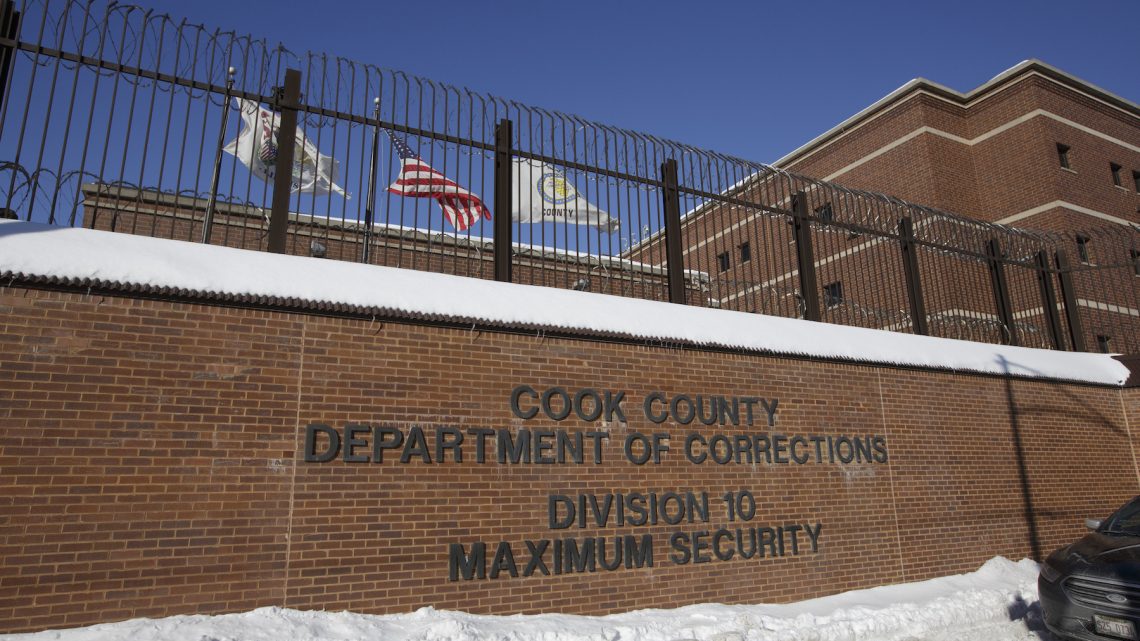
Thousands of Pre-Trial Detainees Are at Risk of Coronavirus Just Because They’re Poor
April 5, 2020Darnell landed in Chicago’s Cook County Jail for a nonviolent crime back in February, when COVID-19 seemed like a distant threat. As the weeks wore on, while sleeping in a dorm with some 300 other inmates, people around him started coughing.
He was stuck there because he couldn’t afford to pay his bond, set at $10,000.
“It was getting really scary in there, as the days started going on. Hearing on the news about shutting down schools and everything closed, guards coming in here in masks and gloves and stuff,” said Darnell, who asked his full name be withheld due to his ongoing case.
In late March, Darnell got bonded out by the Chicago Community Bond Fund, a local group that organizes against money bail or bond, and helps get people out of jail while their case is pending. The same day he left, guards were going around taking everyone’s temperatures. As of Friday, there were 210 confirmed COVID-19 cases among detainees that had resulted in at least a dozen hospitalizations.
Groups like the Chicago Community Bond Fund have suddenly found themselves shouldering the burden of a looming public health crisis inside America’s overcrowded and often dirty jails and detention centers — one that threatens to spill out into their surrounding communities.
READ: Inside the federal prison that's ‘ground zero’ for the coronavirus outbreak.
In Chicago, like many other cities that have been hit by the virus, local officials have shied away from signing a mass release order. In most places grappling with coronavirus, they’ve dragged their feet, sometimes getting tied up in lawsuits, even as public defenders, doctors, and activists urged them to act quickly to get as many people out of jail as possible.
It took weeks of pressure before New York City Mayor Bill de Blasio finally announced the release of 900 detainees from the city’s jails on March 31 — and only after the number of confirmed cases at the city’s notorious Rikers Island jail skyrocketed.
In Chicago’s Cook County, public defenders worked with local officials to identify 100 individuals who were being held on nonviolent offenses, who were pregnant, elderly, or with underlying illnesses, and secure their release one by one. And New Orleans’ sheriff has called on local judges to approve the release of more detainees from the jails, to free up more room to quarantine sick inmates.
Local advocates and community bail funds are frustrated by the pace of jail releases, and feel like they’ve had to step up where local officials have faltered.
“Now it’s not just the injustice because the size of someone’s bank account is keeping them in a cage, but now the size of their bank account could be the determining factor if they survive this pandemic, or have a lifelong health impact or horribly traumatic experience,” said Matt McLoughlin, an organizer with the Chicago Community Bond Fund.
READ: Coronavirus is spreading through America’s prisons and no one is ready.
The Chicago Community Bond Fund is one of about 70 groups in the National Bail Fund Network. In the last two weeks alone, the network spent a combined total of about $2 million to bail people out of jail. That’s compared to the roughly $10 million they spent in the entirety of 2019 by the group, which is funded by participants ranging from relatively deep-pocketed entities to small community groups.
Some groups have ramped up fundraising, like soliciting Venmo donations on social media, while others have essentially emptied their reserve funds because of the emergency, according to Pilar Weiss, director of Community Justice Exchange, which hosts the National Bail Fund Network.
Before the coronavirus pandemic, community bail funds served a dual purpose, said Weiss. They’re a way for community members to stand up for one another, but they’re also a way to protest pretrial detention in and of itself. “They’re not a solution, they’re temporary — an intervention,” said Weiss.
“Normally we’re operating from an abolitionist perspective of wanting to end detention completely, but in this moment we’re coming at it from a public health perspective.”
The fight to end cash bail in the last few years has become the focal point for many criminal justice advocates who say that it’s a glaring example for how the system blatantly favors the rich and discriminates against the poor. There are nearly half a million people sitting in jails across the U.S. who haven’t been convicted of a crime yet — and many of them are stuck behind bars because they can’t afford to post bail.
“It just exposes how cruel and inhumane a system we have.”
New Jersey was one of the first states to essentially eliminate cash bail. New York and California were supposed to follow, but proposed reforms were blocked after an outcry from law enforcement and public safety advocates. New York Gov. Andrew Cuomo has faced intense criticism in recent weeks for supporting a rollback of historic bail reforms. His critics say the rollback will intensify the coronavirus outbreaks inside New York City’s jails.
People advocating for the release of inmates (not just those who can’t afford to post bail, but also those who are elderly, have underlying medical conditions, or are being held on probation violations) stress that the current moment this isn’t just about their safety — it’s also about the wider community. If there’s a coronavirus outbreak in a prison, the guards who work there go home, and potentially expose their neighbors or family members to the virus. What’s more: a major outbreak inside a prison would put additional strain on an already overwhelmed medical system that’s struggling to care for the soaring numbers of COVID-19 patients, as seriously sick inmates would need to be cared for at the nearest hospital.
Community bail funds can require a huge amount of time, dedication and organization from volunteers. That is particularly true in Massachusetts, which has the oldest bail system in the U.S. — and most outdated. Bail has to be posted in person, in cash, to an authorized bail commissioner, who is only available to process payments at certain times of the day.
So when the coronavirus made its way onto American shores, two things became clear to Atara Rich-Shea, the executive director of the Massachusetts Bail Fund. Firstly, jails in the state needed to drastically reduce their inmate population if they wanted to mitigate the risk of the virus spreading. Second, a lockdown order like in China and parts of Europe was probably imminent — which would make it very difficult, if not impossible, to post bail in Massachusetts.
Over a two week period in early March, Rich-Shea and her army of volunteers doubled their usual efforts, emptying their fund, and shuttling $125,000 — in cash — to jails around the state. They posted bail for a total of 192 people before suspending operations March 18, because Rich-Shea said that she longer felt comfortable asking volunteers, many of whom are over the age of 60 or have medical conditions, to put themselves at risk of exposure by going into jails. So far, Massachusetts’ governor has not issued a shelter in place order.
“Really it just exposes how cruel and inhumane a system we have,” said Rich-Shea. “Because there are mechanisms for bulk release, or en masse release. A bail fund is an incredibly enormous undertaking, involving unpaid labour, who do an enormous amount of work to get people out one by one.”
Cover: The Cook County Jail is seen in Chicago, February 7, 2014. (Photo by John Gress/Corbis via Getty Images)


